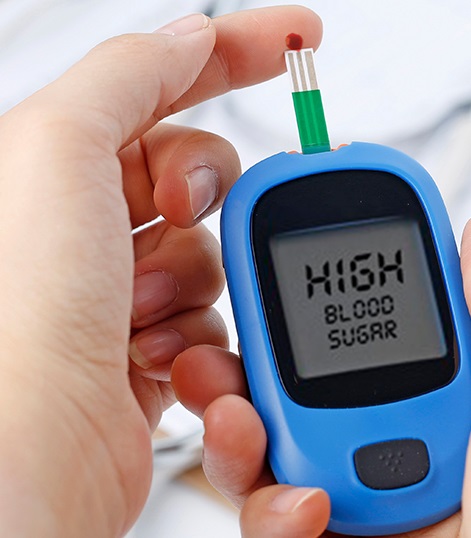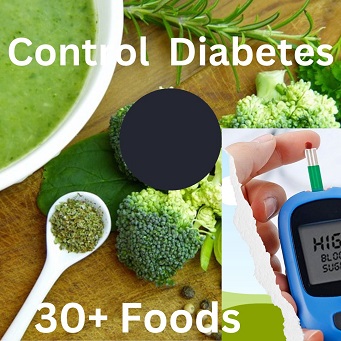There is no single food or “supplement” that can magically cure diabetes or keep it under control. However, a balanced and nutritious diet can play a significant role in managing the condition. Here are a few foods and vitamins that can be beneficial for people with diabetes:

Fiber-rich foods:
Foods high in fiber such as whole grains, legumes, and vegetables can help regulate blood sugar levels and keep you feeling full for longer.
Foods with a low glycemic index:
Foods with a low glycemic index, such as most fruits, non-starchy vegetables, and nuts, are absorbed more slowly into the bloodstream, which helps regulate blood sugar levels.
Magnesium-rich foods:
Magnesium can help improve insulin sensitivity and regulate blood sugar levels. Foods high in magnesium include almonds, cashews, spinach, and black beans.
Omega-3 fatty acids:
Omega-3 fatty acids, found in fatty fish such as salmon, can help reduce inflammation and improve insulin sensitivity.
Cinnamon:
Cinnamon has been shown to improve insulin sensitivity and regulate blood sugar levels.
Bitter melon:
Bitter melon is a traditional herb used to regulate blood sugar levels.
Here are some more foods and vitamins that may be beneficial for people with diabetes:
Chromium:
Chromium is a mineral that helps regulate insulin and blood sugar levels. Foods high in chromium include whole grains, broccoli, and potatoes.
Zinc:
Zinc is a mineral that helps regulate insulin and blood sugar levels. Foods high in zinc include oysters, beef, and chickpeas.
Alpha-lipoic acid:
Alpha-lipoic acid is an antioxidant that has been shown to improve insulin sensitivity and regulate blood sugar levels. Foods high in alpha-lipoic acid include spinach, broccoli, and potatoes.
Berberine:
Berberine is a compound found in some herbs and plants that has been shown to improve insulin sensitivity and regulate blood sugar levels.
Ginger:
Ginger has been shown to improve insulin sensitivity and regulate blood sugar levels.
Green tea:
Green tea is rich in antioxidants and has been shown to improve insulin sensitivity and regulate blood sugar levels.
Here are some more foods and herbs that may be beneficial for people with diabetes:
Turmeric:
Turmeric is a spice that has anti-inflammatory and antioxidant properties, and has been shown to improve insulin sensitivity.
Fenugreek:
Fenugreek is a herb that has been shown to improve insulin sensitivity and regulate blood sugar levels.
Guggulu:
Guggulu is a resin derived from the mukul myrrh tree, and has been used in Ayurvedic medicine to treat a variety of health conditions, including diabetes.
Gymnema:
Gymnema is an herb that has been used for centuries in Ayurvedic medicine to regulate blood sugar levels.
Please note that while these foods and herbs may be beneficial for people with diabetes, they should not be used in place of prescribed medications or other treatments recommended by a doctor. Additionally, some herbs and supplements can interact with medications, so it’s important to talk to your doctor before starting any new supplement regimen.
Vitamin C:
Vitamin C is an antioxidant that helps improve insulin sensitivity and regulate blood sugar levels. Good sources of vitamin C include citrus fruits, strawberries, and bell peppers.
Vitamin D:
Vitamin D is important for bone health and may also play a role in insulin sensitivity. Good sources of vitamin D include fortified dairy products, fatty fish, and exposure to sunlight.
Vitamin E:
Vitamin E is an antioxidant that has been shown to improve insulin sensitivity and regulate blood sugar levels. Foods high in vitamin E include almonds, sunflower seeds, and avocado.
Again, please do remember that these foods and vitamins should be consumed as part of a balanced and nutritious diet, and not relied on as the sole method of managing diabetes. If you have diabetes, it’s essential to work with your doctor to develop a personalized treatment plan that meets your individual needs and goals.
Biotin:
Biotin is a B-vitamin that plays a role in carbohydrate metabolism and has been shown to improve insulin sensitivity. Foods high in biotin include eggs, almonds, and sweet potatoes.
Nopal:
Nopal is a type of cactus that has been used in traditional Mexican medicine to treat diabetes.
Vanadium:
Vanadium is a mineral that has been shown to improve insulin sensitivity and regulate blood sugar levels. Foods high in vanadium include mushrooms, shellfish, and black pepper.
Probiotics:
Probiotics, which are live microorganisms found in fermented foods and dietary supplements, have been shown to improve insulin sensitivity and regulate blood sugar levels.
Resveratrol:
Resveratrol is a compound found in grapes and red wine that has been shown to improve insulin sensitivity and regulate blood sugar levels.
Quercetin:
Quercetin is a type of flavonoid found in fruits and vegetables that has been shown to improve insulin sensitivity and regulate blood sugar levels.
Chromium Picolinate:
Chromium picolinate is a form of the mineral chromium that has been shown to improve insulin sensitivity and regulate blood sugar levels.
Banaba leaf extract:
Banaba leaf extract is derived from the banaba plant and has been shown to improve insulin sensitivity and regulate blood sugar levels.
Coenzyme Q10 (CoQ10):
Coenzyme Q10 (CoQ10) is a compound that has been shown to improve insulin sensitivity and regulate blood sugar levels. Foods high in CoQ10 include fatty fish, organ meats, and whole grains.
Whole grains:
Whole grains, such as brown rice, whole wheat, and oats, are high in fiber and have a low glycemic index, which can help regulate blood sugar levels.
Leafy greens:
Leafy greens, such as spinach, kale, and collard greens, are low in carbohydrates and high in fiber, which can help regulate blood sugar levels.
Berries:
Berries, such as strawberries, blueberries, and raspberries, are low in carbohydrates and high in fiber, which can help regulate blood sugar levels.
Nuts and seeds:
Nuts and seeds, such as almonds, chia seeds, and flax seeds, are high in healthy fats, fiber, and protein, which can help regulate blood sugar levels.
Fatty fish:
Fatty fish, such as salmon, mackerel, and sardines, are high in omega-3 fatty acids, which can improve insulin sensitivity and regulate blood sugar levels.
Legumes:
Legumes, such as lentils, chickpeas, and black beans, are high in fiber, protein, and low in carbohydrates, which can help regulate blood sugar levels.
Vinegar:
Vinegar, especially apple cider vinegar, has been shown to improve insulin sensitivity and regulate blood sugar levels.
It is important to note that these foods should be consumed as part of a balanced and healthy diet, and not relied on as the sole method of managing diabetes. If you have diabetes, it is essential to work with your doctor to develop a personalized treatment plan that meets your individual needs and goals.
As with any supplement or dietary change, it is important to speak with your doctor before starting any new regimen, especially if you are taking medication for diabetes. A balanced and nutritious diet, regular physical activity, and any prescribed medications are the best ways to keep diabetes under control.

